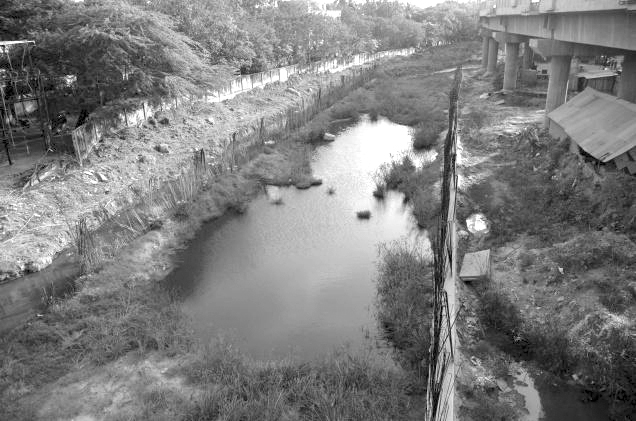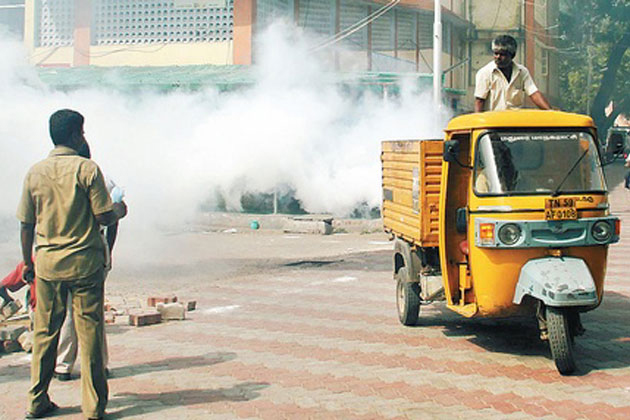
Ideal breeding conditions for mosquitoes...
|

... and preventive steps taken by the Corporation.
|
The National Institute of Malaria Research, a decade ago, identified Chennai as an endemic area for malaria. Recently, the Union Health Ministry ranked Tamil Nadu as the State with the highest prevalence of dengue. With the City Corporation now extended from 174 to 426 square kilometres, the number of malaria cases will only increase exponentially, states a highly-placed official.
I wouldn't be surprised at all if the ubiquitous mosquito becomes the new mascot of Chennai city. Never in the history of the city has it been that even the powers-that-be have been defeated by so tiny a species. There is no locality where residents don't complain of sleepless nights and oppressive drones!
Though the Corporation continues to spend more than Rs. 5 crore annually on mosquito control, 'mosquito control' is big business whether you live in a mosquito-prone area or travel to one. But sprays, mosquito coils, mosquito mats and mosquito repellents, even nets with 'anti bite layers', have failed miserably. Says V. Kasiraman, resident of Ashok Nagar, "Even in our third floor apartment, streams of mosquitoes spoil our sleep."
"Poor quality stormwater drains, and garbage accumulation in vacant plots/streets have facilitated water stagnation and breeding of mosquitoes," says a resident in T'Nagar. But when contacted, Corporation authorities express inability to do anything about these problems, and blame the PWD and blocked rivers!
A few weeks ago, some Adyar residents, including T.V. Antony, former Chief Secretary, went up to the Adyar to check the river out and found construction debris dumped under the old Adyar bridge, and a huge sand bar at the mouth.
Experts at the Directorate of Public Health state that stagnation of water, especially untreated effluents, will increase larvae and mosquito density. And a former Director emphasises that such water allows for rampant breeding of mosquitoes. The PWD, it is reported, now proposes to take up dredging work in the Adyar river every 15 days, as is the practice along the Cooum, to prevent mosquito breeding.
For the Corporation, mosquito breeding in across 25,000 unoccupied plots of land, 2,00,000 overhead tanks, 74,526 wells, 65,166 sumps and 1,300 km of stormwater drains is certainly a major challenge!
Rules ignored
The Tamil Nadu Public Health Act of 1939 states that no person shall have, keep or maintain within such area any collection of standing or flowing water in which mosquitoes breed or are likely to breed. "But drains are left open even in many Corporation areas!" states an official.
Seven types of drugs, including Pyrithrin and Betax, are used for spraying. Anopheles stephens, the mosquito that transmits malaria, breeds in clear water, wells and overhead tanks. Rainwater harvesting centres also serve as breeding grounds for mosquitoes! Aedes aegypti spreads dengue fever and chikungunya. "Mosquitoes can migrate up to half kilometre and infect residents," explains an entomologist.
P. Srimathi from Mandaivelipakkam says fogging and spraying are of little help. The Corporation recently passed a resolution to distribute mosquito nets to residents along 16 minor and major waterways, including the Cooum and Adyar Rivers and the Buckingham Canal. A recent drive was undertaken to remove old tyres, waste plastic buckets, coconut shells and other such items that can hold water, as they are perennial breeding grounds. "We have cleared around 200 tonnes of old unused tyres from the city," states a Corporation official.
"Construction sites are a major breeding source, since water is stagnant for around seven days for curing. Mosquito larvae need just five days to become adults! Just 20 gram of bleaching powder in a litre of water is enough to prevent mosquito breeding in such areas," advises the entomologist. Over 15,000 construction sites exist in the city today.
B. Dhanraj, retired Chief Vector Control Officer and Fellow of the Indian Society of Malaria and Other Communicable Diseases, says nearly 90 per cent of the mosquitoes in the city breed in stormwater drains and canals. Government should follow the Mumbai example where a water connection is not given unless the well and overhead tanks are closed. "The Chennai Corporation initiated a project a few years ago to issue notices to those with uncovered overhead tanks. But what is the point of covering the old tanks if new buildings are coming up with open tanks? Town Planning Rules must ensure that open tanks are not allowed," he urges. Around two lakh illegal sewage connections in Chennai add to the existing woes!
Biocontrol
Biocontrol measures began with the introduction of gambussia fish in 2009 feed on mosquito larvae. In 2010, ovi traps were introduced in major canals and drains; their chemicals were meant to destroy mosquito eggs. Then came the introduction of eco bio block for treating sewage water.
The Corporation's latest solution to fight mosquitoes is the nochi (Vitex nigundo) plant, which will be distributed to households by the side of canals and waterways. The plant reportedly contains vitnocide alkaloids that repel mosquitoes.
A disgusted resident in the Kotturpuram area, which is better known as 'Kosu (mosquito) puram', says, "Instead of cleaning the canals and water bodies, why give us plant remedies?"
Currently, vexed citizens across the city are furious "with what they feel is the Corporation's inefficiencies and lethargy in tackling the mosquito menace." But Corporation officials say they are working to a 6-point action plan, under which 15 zones will receive brand new equipment for spraying insecticides in all streets. Anti-malaria workers will be deployed in each of the 200 wards. "But the only real solution will be by keeping the waterways, drainage systems, and public spaces clean," points out a senior expert. But citizens too can and should play a role.
They should become agents of change by taking care of their own homes and backyards, by closing overhead and other tanks as well as drains and sewage tanks, and getting rid of old tyres, mugs, pots, buckets and other receptacles that can hold water. That's a long haul, but it's still a start.
The City Corporation is currently planning to introduce sterile male mosquitoes to control breeding. "In glass houses 20 feet by 100 feet, minimum one lakh mosquitoes can be nurtured of which 40 per cent may be male. The females will be separated by attracting them using male pheromones and then killed. The male mosquitoes will be subjected to gamma radiation of appropriate dosage to make them sterile. The sterile male will be introduced in neighbourhoods to ensure female mosquitoes lay infertile eggs. After the female lays eggs, it dies; the infertile eggs will not hatch. This will lead to reduction in the number of mosquitoes," says an official.
|